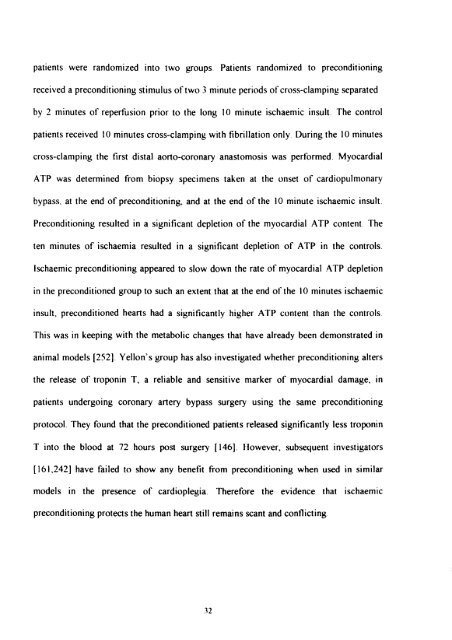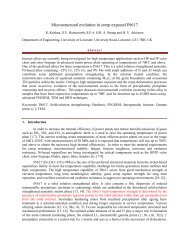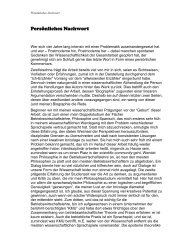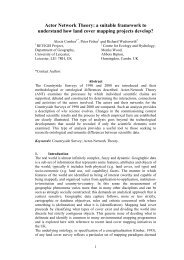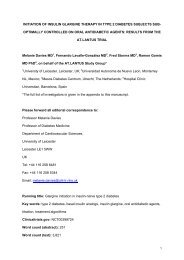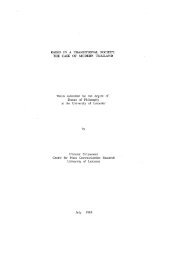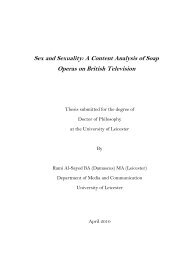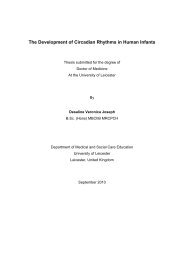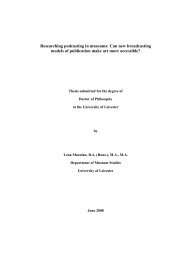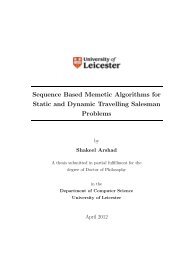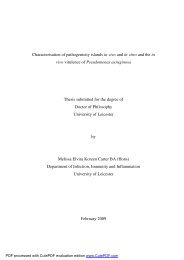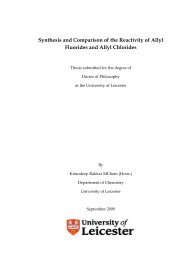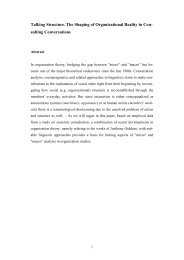- Page 1 and 2: ISCHAEMIC PRECONDITIONING OF THE HU
- Page 3 and 4: ABSTRACT Ischaemic preconditioning
- Page 5 and 6: andomised clinical study with the f
- Page 7 and 8: CHAPTERI Introduction 35 Matefials
- Page 9 and 10: Discussion 151 CHAPTER Vill Conclus
- Page 11 and 12: 44 CK leakage and MTT reduction on
- Page 13 and 14: The Wellcome Trust and The British
- Page 15 and 16: Presentations International "The Ef
- Page 17 and 18: Abbreviations An attempt has been m
- Page 19 and 20: 1.1 Introduction Ischaernic heart d
- Page 21 and 22: 1.2 Myocardial Ischaemia Myocardial
- Page 23 and 24: hours up to several days to complet
- Page 25 and 26: phosphates and its influence on hyd
- Page 27 and 28: 1.4 Myocardial Protection This refe
- Page 29 and 30: performed. This process is repeated
- Page 31 and 32: 1.6 Possible Mechanisms of Ischaemi
- Page 33 and 34: kilodalton stress proteins. These p
- Page 35 and 36: and these proteins have been sugges
- Page 37 and 38: K vi-1, channels were initially fou
- Page 39 and 40: tissues the K.. %,.,, channels are
- Page 41 and 42: Subsequently, Jaburek et al 1145] i
- Page 43 and 44: venous capacitance vessels. At ther
- Page 45 and 46: preconditioning to be investigated
- Page 47: In the angioplasty model, Tomai et
- Page 51 and 52: CHAPTER 11 THE HUMAN RIGHT ATRIAL T
- Page 53 and 54: inexpensive. Briefly in this model,
- Page 55 and 56: of each ischemic period, slices wer
- Page 57 and 58: 30 nini FO linlin L 60 min 120 inin
- Page 59 and 60: In Study 3 (see Figure 2.4), slices
- Page 61 and 62: D. Metabolite analysis Samples were
- Page 63 and 64: leakage is calculated as the net LD
- Page 65 and 66: B. Effect of the severity of ischae
- Page 67 and 68: 2.11 DISCUSSION: The present studie
- Page 69 and 70: clearly insufficient to induce myoc
- Page 71 and 72: The present model may facilitate th
- Page 73 and 74: 2.12 Conclusiow I have characterise
- Page 75 and 76: 3.5 3 V 2.5 3: m Je m Z0 z 2 1.5 0.
- Page 77 and 78: (3 3 2.5 a 1.5 - -r T 0 2 0.5 0 I P
- Page 79 and 80: Q oro . 21 . 0 'a IP 10 '. R -C3 A
- Page 81 and 82: =3 0 h X CD 0 x CD :3 0 , 7, CD 0 0
- Page 83 and 84: CHAPTER III PRECONDITIONING THE HUM
- Page 85 and 86: 3.2 MATERIALS AND METHODS-. 3.2.1 E
- Page 87 and 88: A117'reduction- At the end of the e
- Page 89 and 90: -4 ýi r. () .1 a 0 1 tli n F5* - C
- Page 91 and 92: v M. %; n C) .0 ý U ý ý - - - -2
- Page 93 and 94: leakage resulting from precondition
- Page 95 and 96: 3.5 DISCUSSION: The present studies
- Page 97 and 98: during cardiac surgery totalling 10
- Page 99 and 100:
different. The cellular mechanisms
- Page 101 and 102:
cn Je 8 7 6 5 4 1 0 0.8 0.7 0.6 0.5
- Page 103 and 104:
8 6 C) 2 0.7 0.6 Q) 0.5 0) E 25 0.4
- Page 105 and 106:
6 5 CY) ,u3 CF) m -ýe m 2 1 0 -0.8
- Page 107 and 108:
CHAPTERIV THE ROLE OF THE KATPCHANN
- Page 109 and 110:
It has been reported that K.. %-I-p
- Page 111 and 112:
0 a- I a 3 I cr =r Cl. 2 qQ 0'-ý 0
- Page 113 and 114:
Figure 4.7 shows that ischaemia alo
- Page 115 and 116:
Figure 4.2 Dosc-responsc experiment
- Page 117 and 118:
Figure 4.4 Dose-response experiment
- Page 119 and 120:
Figure 4.6 Dosc-response experiment
- Page 121 and 122:
1 0.9 -ý 0.8 0.7 E 0.6 0.5 0.4 0.2
- Page 123 and 124:
activity, and showed that diazoxide
- Page 125 and 126:
Furthermore, Van den Hoek et al [3
- Page 127 and 128:
mechanism by which the opening of m
- Page 129 and 130:
5.1 INTRODUCTION: Within the enormo
- Page 131 and 132:
5.2 MATERIALS AND METHODS: 5.2.1 Ex
- Page 133 and 134:
M77'rechiction: At the end of the e
- Page 135 and 136:
oc 0 0 cr F; * 10 eb I ý; o I 5 0
- Page 137 and 138:
Pages missing original in the
- Page 139 and 140:
esulted in a decrease of CK leakage
- Page 141 and 142:
are on long-term hypoglycaernics or
- Page 143 and 144:
absence of uniformity of expeniment
- Page 145 and 146:
5.7 Conclusion Preconditioning is a
- Page 147 and 148:
0.9 0.8 07 m 0.6 E -0 0t 4 0.3 02 0
- Page 149 and 150:
-0 1.2 1 &8 0.6 04 0.2 o Aerobic Is
- Page 151 and 152:
6.1 INTRODUCIFION' Life expectancv
- Page 153 and 154:
(MI-T) to blue t'()rmazan product C
- Page 155 and 156:
The demonstration that ischaemic in
- Page 157 and 158:
Table 61 Patients' demographic and
- Page 159 and 160:
Nure 6,1: Creatine Kinase (CK) leak
- Page 161 and 162:
CHAPTER VII IN VIVO STUDIES ON T"E
- Page 163 and 164:
The apparent discrepancy bet,.,,, e
- Page 165 and 166:
In the off-pump group, coronary byp
- Page 167 and 168:
eduction as described in section 3.
- Page 169 and 170:
7.4.2 In vitro studies Figures 7.3A
- Page 171 and 172:
preconditioning stimulus in man is
- Page 173 and 174:
myocardium. Several investigators [
- Page 175 and 176:
Table 7.2 - Patients haemod-v-namic
- Page 177 and 178:
(0 -I 3 CD CD CD 1 3 0 :3 0 0 =r w
- Page 179 and 180:
0 co t X 3 co 0 0 Cumulative Releas
- Page 181 and 182:
-& a) c) UT 0 =r w CD 3 CD 0 1ý (a
- Page 183 and 184:
When ischaernic preconditioning was
- Page 185 and 186:
evidence tbr the involvement ot'PKC
- Page 187 and 188:
institution o fcardiopu Imo nary by
- Page 189 and 190:
Biblioqraphv 1. Abete P, Ferrara N,
- Page 191 and 192:
14. Auchampach J, Cavero, I and Gro
- Page 193 and 194:
27. Becker LB, Van den Hoek TLV, Sh
- Page 195 and 196:
41. Bums PG, Krunkenkamp IB, Calder
- Page 197 and 198:
55. Cohen G, Shirai T, Weisel RD, e
- Page 199 and 200:
69. Currie RW and White FP (1983).
- Page 201 and 202:
83. Downey JM, Liu GS and Thornton
- Page 203 and 204:
97. Ganote C, Armstrong S and Downe
- Page 205 and 206:
110. Grover GJ, D'Alonzo A, Hess T,
- Page 207 and 208:
122. Hamilton T and Weston A (1989)
- Page 209 and 210:
137. Hu H, Sato T, Seharaseyon J, L
- Page 211 and 212:
151. Jennings R, Steenbergen C, Kin
- Page 213 and 214:
164. Kelpzig H, Kobert G, Mafter C,
- Page 215 and 216:
178. Lamping K, Christensen C, Pelc
- Page 217 and 218:
192. Liu GS, Thornton J, Van Winkle
- Page 219 and 220:
206. Maulik N, Yoshida T, Das DK. (
- Page 221 and 222:
219. Miyawaki H, Zhou X, Ashraf, M.
- Page 223 and 224:
233. Okazaki Y, Kodama K, Sato H, K
- Page 225 and 226:
248. Pryzlenk K, Li G, Whittaker P
- Page 227 and 228:
260. Saito S, Tamura Y, Moriuchi M,
- Page 229 and 230:
274. Schulz R, Post H, Valhaus C, e
- Page 231 and 232:
288. Stewart JR, Blackwell WH, Crut
- Page 233 and 234:
300. Tani M, Suganuma Y, Hasegawa H
- Page 235 and 236:
312. Tosaki A, Engelman DT, Engelma
- Page 237 and 238:
324. Walker D, Marber M, Walker J a
- Page 239 and 240:
337. Yamashita N, Nishida M, Hoshid
- Page 241 and 242:
351. Zhang JG, Lindup WE. (1993). R
- Page 243 and 244:
444 J. -G. Zhang and others are dif
- Page 245 and 246:
446 J. -G. Zhang and others Assessm
- Page 247 and 248:
448 J. -G. Zhang and others 0.9 0.8
- Page 249 and 250:
450 J. -G. Zhang and others C E 07
- Page 251 and 252:
4S2 J. -G. Zhang and othen effects
- Page 253 and 254:
ELSEVIER Abstract Cardiovascular Re
- Page 255 and 256:
936 S. Ghosh et al. / Cardiovascula
- Page 257 and 258:
938 S. Ghosh et al. / Cardiovascula
- Page 259 and 260:
940 S. Ghosh et al. [41 Goto M, Liu
- Page 261 and 262:
712 0" et &L h wcomMe geg in Obwa»
- Page 263 and 264:
714 Gbosb ot aL hmoo dmoWmbDbsnedH
- Page 265 and 266:
716 chmä et aL Pi unamOso äu In O
- Page 267:
718 ehe* et &L ditioning in the hum


